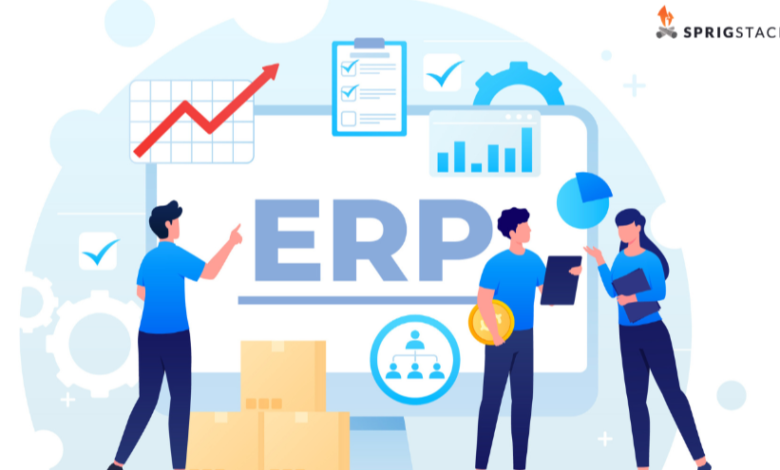
Tools for Enterprise Resource Planning are much sought after by companies. It can enable them to streamline procedures, increase output, and improve data handling. Still, establishing an ERP system comes with significant financial expenditure. You must know how to gauge its success if you want to be sure you are reaping advantages. Let’s consider the most important things you should consider when judging how well your ERP implementation went. These things will ensure that the money you spend on ERP development services pays off.
Define Clear Objectives Before Implementation
Starting long before the introduction is the first step in measuring ERP success. Setting clear, measurable goals that align with your business’s goals is very important. Some of these goals could be better data clarity, streamlined routines, better ways to make decisions, or lower costs.
When you work with ERP development services, ensure these goals are written down and everyone agrees on them. It will help you figure out if the ERP system is doing what you want it to do.
Important Questions:
- In what ways does your ERP system aim to improve things?
- Have you developed crucial performance markers to help you reach your business goals?
- Are your goals in line with the company’s long-term plan?
Evaluate Employee Adoption Rates
The staff adoption rate is one of the strongest indicators of whether an ERP system performs as intended. Your ERP system won’t run as well as it might if your employees lack strong knowledge of utilizing it. The tools are ultimately valuable because the users make them so.
You may determine how well the service is performing by looking at use metrics such frequency of logging in, frequency of using particular features, and degree of satisfaction with the service. Your employees’ claims that the ERP system speeds up and simplifies their duties point to a successful implementation.
Essential Things to Keep an Eye on:
- How many workers are regularly using the ERP system
- Rate of questions or tickets about the system
- Satisfaction numbers and comments from users
Assess Operational Efficiency
Companies purchase ERP systems mainly to enable more seamless running of their businesses. Adopting ERP properly should assist workers from many departments collaborate better, keep your data more accurate, and enable more seamless operations.
Track metrics like order handling times, warehouse management efficiency, and less manual data entry to see how much business efficiency has improved. Ensuring these measures are part of the system’s data dashboard is essential when using ERP development services. It will let you see how things are going in real-time.
Key Signs of Success:
- Order handling times will be shorter.
- Fewer mistakes when entering data
- Better teamwork and contact between departments
Financial Performance and ROI
Financial efficiency is another essential way to judge the success of an ERP system. Has the ERP system helped cut costs or bring in more money? Finding the Return on Investment is essential to know if implementing ERP was a good business choice.
You can find the return on investment (ROI) by comparing the execution costs. These include software, hardware, training, and ERP development services. The financial benefits come from higher profits, lower costs, and better efficiency.
Read more: How to Create Memes for Social Media Engagement in 2024
Financial Signs to Keep an Eye On:
- Total cost of ownership vs. money saved
- Increased sales after implementation
- Less money spent on operations or production
Monitor System Performance and Scalability
Apart from satisfying your present demands, a strong ERP system should be able to expand with your company. Performance or system slowdowns might indicate that the ERP solution is not fit for your future demands.
Monitoring system speed regularly can help you find any slowdowns, data delays, or other problems that might make running your business harder. Also, to grow your business, you should ensure the system can handle more data, users, and deals without slowing down or losing usefulness.
Important Measures:
- Uptime and downtime of the system
- How fast you can process big amounts of info
- Having the ability to handle more transactions
Customer Satisfaction and Service Improvement
The people who benefit from your ERP setup are your customers. An ERP system that works well should improve order accuracy, shipping speed, and customer service.
Check the levels of customer happiness before and after implementing the ERP to see if there is a clear difference. Also, keep an eye on things like the time it takes to complete orders, the number of mistakes during deliveries, and customer comments. It will make sure that the ERP system has a good effect on how you handle customer service.
Focused on the Customer Metrics:
- Surveys of customer happiness
- Order arrival times shortened
- Rates of order handling without mistakes
Continuous Improvement and System Optimization
ERP systems are tools meant to continuously improving as your company expands; they are not a one-time fix. Ensuring the ERP system stays in line with your changing business needs requires regular changes and improvement.
Work closely with your ERP development services company to check the system’s performance regularly, find ways to improve it, and apply changes. This proactive method will ensure that your ERP system keeps giving you value over time.
Steps for Continuous Improvement:
- Regular studies and checks of the system’s performance
- Taking into account comments from stakeholders and workers
- Setting up training classes and system changes
Compliance and Risk Management
The ERP system’s ability to help your company stay in line with industry rules and lower risk is another critical success factor. Setting up your ERP correctly should make audit trails easier, protect your data better, and ensure you follow all necessary regulations.
You can be sure that the implementation was successful if your ERP system makes it easier to report, makes audit tracks clearer, and makes data more secure. For legal compliance, many ERP development services offer unique features. This can help simplify these steps and lower the chance of not following the rules.
Signs of Compliance Success:
- Streamlined methods for reviewing and reporting
- Better steps to protect info
- Less chance of financial penalties
Conclusion
There’s more to figuring out how well your ERP setup is going than just ensuring the system is up and running. You need to look at the ERP system as a whole to see how well it fits with your business goals, makes operations more efficient, makes employees and customers happier, and makes money.
You can ensure that your ERP system gives you long-term value and helps your business grow by closely monitoring these factors and working with your ERP development services provider. Remember that a good ERP adoption is not a one-time thing, but a process that goes on over time and changes as your business does.




